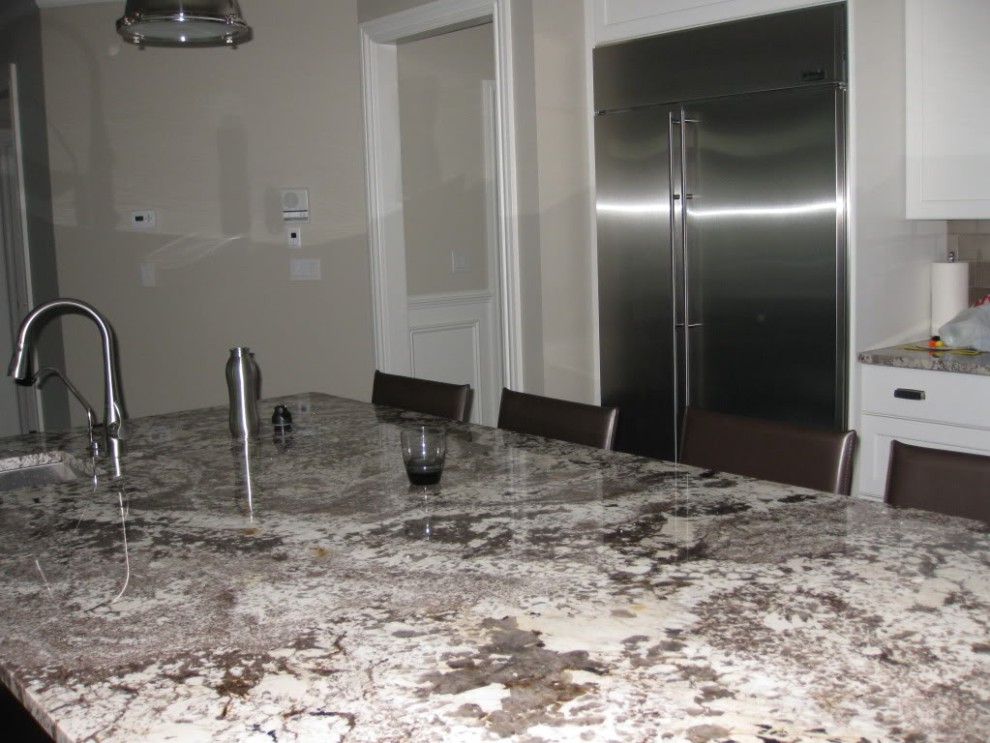Natural stone provides a unique appeal to many surfaces around the home in the kitchen, bathroom and common areas. Because these surfaces are unique, they require special methods and products to take care of them.
Components of Stone Care
Cleaning stone tile can involve removing various types of residue and debris. Oil residue is common for back splashes in the kitchen, and it is usually from food preparation or frying. Stains are also a typical problem, and organic stains tend to include food, mildew, mold and pet waste. Rust stains are more difficult to treat than oil and organic matter.
Disinfecting these surfaces goes beyond simple cleaning and destroys microorganisms that live there. Surfaces in the kitchen are most prone to harmful germs that are spread easily to other members of the household. This problem can be handled with disinfecting wipes made for natural stone that kill bacteria and leave surfaces free of damage.
Polishing involves enhancing the shine of the stone tile for improved esthetic appeal. It serves the added benefit of protecting against stains caused by moisture and debris. Stone floors should not be polished as they will become too slippery and pose safety hazards.
To help stone stay cleaner for longer periods, sealing protects surfaces from staining and soiling. It also protects against residue buildup and scratches. Natural stone tile should be checked frequently for leaks and sealed as needed.
Essential Stone Tile Care Products
Natural stone surfaces have different needs from other natural or synthetic materials, and they require special products in order to clean them. There are numerous formulas for different stone tile surfaces throughout the home.
Grout Cleaner: Standard all-purpose cleaners can be harmful when attempting to clean grout as they can be damaging to surrounding surfaces. Quality grout cleaner is strong enough to remove deep stains but gentle enough to avoid damage. The best cleaner also works on colored grout without lifting the color.
Shower Cleaner: Showers with stone tile or granite can be more difficult to clean compared to those made with other materials. If these surfaces are damaged by harsh chemicals, repairing or replacing the shower surface can be expensive. Shower cleaners made for stone tile should be effective against soap scum, mold and mildew while still resisting any surface damage.
Stone Polish: Stone polish helps restore luster and shine to granite, marble and other surfaces. It should be used after the stone surface has been cleaned to remove loose or stuck soil. Stone polish also provides protection against water spots, soap scum and fingerprints.
Granite Sealer: Stone sealers work to protect surfaces like polish, but their purpose is less for esthetics and more for function. The right stone sealer can create a barrier that protects the stone surface from external moisture. Ideal sealers only require spraying and wiping the product without complicated rubbing.
Floor Cleaner: Just like stone tile in bathrooms and kitchens, stone and granite floors must be cleaned with the appropriate products. Cleaners for stone floors allow surfaces to be cleaned without damaging them. These solutions break down oil, dirt and debris, and they are great for high-traffic walkways.
Stone Tile Care Tips
There are vital details every homeowner should remember when cleaning or treating stone surfaces. Taking special care can mean the difference between having beautiful and functional surfaces or prematurely damaging them in ways that could have been avoided.
Materials such as granite, marble and limestone are porous, and exposure to excessive moisture can cause stains, oxidation or breakdown of the surface. When sealing, penetrating products should be used to combat this problem while also protecting surfaces from dust deposits in small crevices.
Natural surfaces should not be left in contact with acidic solutions. Any spills of juice, wine, vinegar or coffee should be wiped immediately. This also applies with cleaning products, and no acidic formulas should be used to clean stone surfaces. Cleaners and sealers should be applied with clean and soft sponges or cloths followed by dry cloths.
Coasters and mats should be used under glasses and bowls on stone counters, and toiletries containing liquids should be stored in containers rather than on the bare surface. For stone tile floors, mats and rugs should be placed down to protect the floor from scratches, dirt and dust. Floors should be dust mopped to eliminate dust or larger particles that may damage the surface.
It is important to discover and use only the proper products for cleaning and maintaining natural stone surfaces in the home. These surfaces can provide a durability and style not experienced with surfaces made of synthetic materials. With careful and appropriate treatment, stone tile surfaces can last for decades.
Visit Granite Gold for more information

